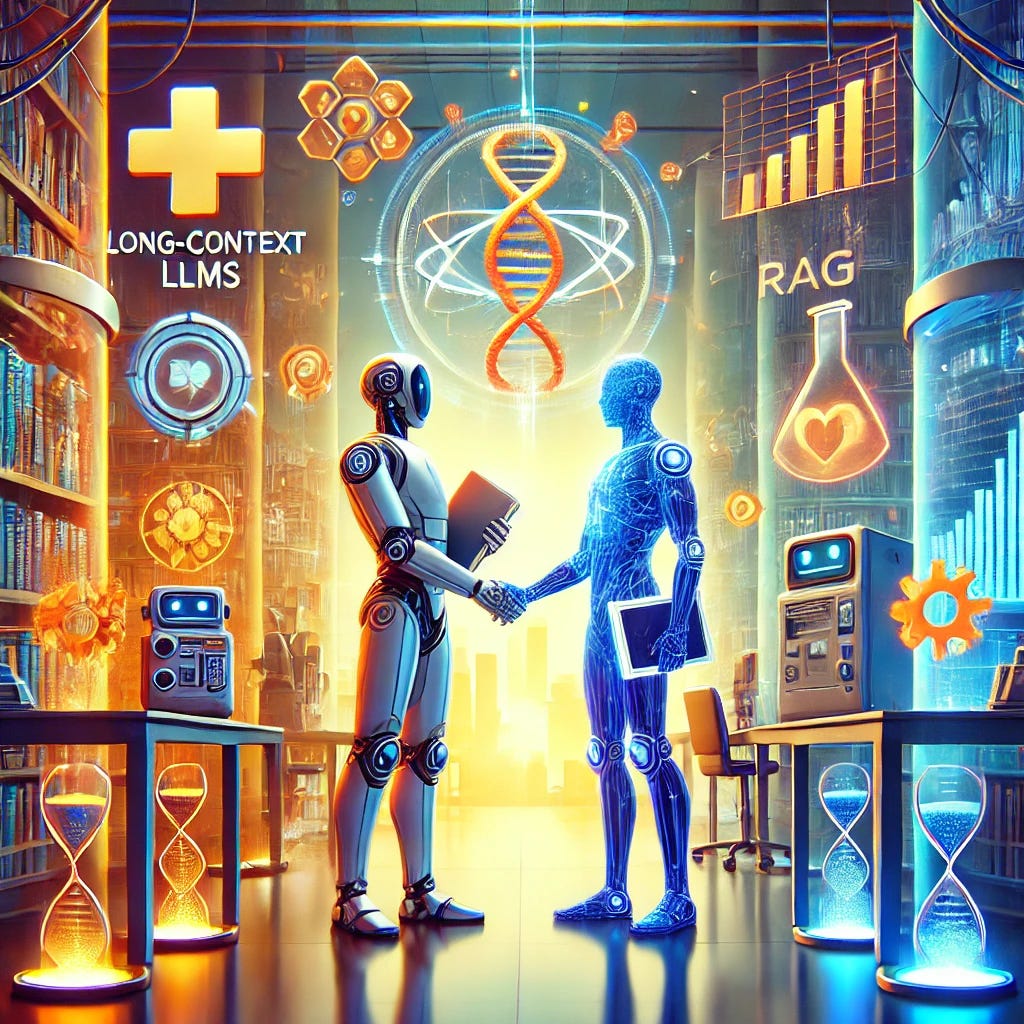The Future of AI - Will Long-Context LLMs Replace RAG?
The AI Tech Showdown: Long-Context LLMs vs. RAG - A Love Story, Not a Battle
As the AI landscape continues to evolve, one question keeps sparking debate: will Long-Context LLMs (Large Language Models) make Retrieval-Augmented Generation (RAG) obsolete? While both technologies push the boundaries of what's possible in AI, they serve distinct purposes and offer complementary strengths.
Let’s dive into what makes each approach unique and why the future might belong to a harmonious blend of the two.
Understanding Long-Context LLMs
Long-Context LLMs extend their memory to process significantly larger inputs—up to 1 million tokens in emerging models. Imagine a single AI interaction encompassing entire books, research papers, or even complex system logs. This leap offers:
Seamless Context: Handling lengthy inputs without breaking them into smaller chunks, reducing errors and improving coherence.
Enhanced Narrative Flow: Perfect for tasks requiring uninterrupted attention to detail over extended content.
However, this comes at a cost:
Computational Demands: The sheer processing power required for long contexts is immense.
Latency Concerns: Real-time applications might struggle under the weight of processing such vast data.
Accuracy Limitations: Models risk "losing focus" mid-context, especially in ultra-long scenarios.
RAG: A Smarter Retrieval System
In contrast, RAG marries language models with external databases, creating a symbiotic relationship where the model retrieves relevant data as needed. Its strengths lie in:
Efficiency: Focusing only on what’s relevant, minimizing computational waste.
Scalability: The ability to access vast amounts of external data without bloating the model’s size.
Real-Time Updates: Access to the most current and accurate information—a game-changer for dynamic industries.
Challenges do exist, particularly in managing retrieval delays and ensuring database reliability. But the practical benefits often outweigh these concerns.
The Debate: Replacement or Collaboration?
While Long-Context LLMs aim to simplify by handling everything internally, RAG leverages external resources to offload unnecessary burdens. The strengths of one often address the limitations of the other:
Unified Processing: Long-Context LLMs excel in tasks where uninterrupted, extensive context is crucial.
Dynamic Retrieval: RAG shines in scenarios demanding real-time updates or domain-specific expertise.
Instead of competition, the real opportunity lies in hybrid approaches:
Hybrid Models: Using RAG to pre-select relevant information, then feeding it into Long-Context LLMs for detailed analysis.
Dynamic Context Management: Employing intelligent systems to populate context windows with the most pertinent data, blending real-time retrieval with comprehensive processing.
A Glimpse Into the Future
The future of AI isn’t about choosing between Long-Context LLMs and RAG—it’s about harnessing the best of both worlds. Imagine systems that:
Optimize Coherence: Maintaining narrative flow without sacrificing accuracy.
Maximize Efficiency: Retrieving relevant data while managing computational loads.
Enhance Flexibility: Adapting to diverse tasks with minimal trade-offs.
This synergy could unlock new possibilities, from revolutionizing research and education to enhancing real-time analytics in industries like finance and healthcare.
Final Thoughts
As we continue exploring these technologies, the question isn’t whether Long-Context LLMs will make RAG obsolete—it’s how we can creatively combine them to redefine AI’s potential.
Let’s focus on building tools that don’t just push boundaries but also deliver practical, scalable solutions. The future of AI isn’t just bright—it’s collaborative.
Join me as we push the boundaries of AI-driven conversations!
Business intelligence with advanced AI machine learning technologies for secure local & private use tools.
AI-Based Consulting - Ask about custom AI LLM solutions.
#blockcheckbook #MachineLearning #DataScience #aitool
#ArtificialIntelligence #AI #DeepLearning #RAG #LLM


